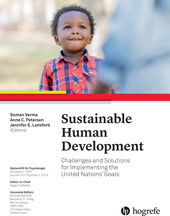How Connecting Psychology and Implementation Science Supports Pursuing the Sustainable Development Goals
Abstract
Abstract. Developing and implementing specific programs and interventions that target the United Nations’ Sustainable Development Goals (SDGs) is a complex endeavor that benefits from an interdisciplinary perspective. In this article, we describe how psychology and implementation science provide knowledge on (1) developing interventions and adapting existing programs to different contexts, (2) systematically and sustainably implementing interventions at different system levels, and (3) evaluating and monitoring the effectiveness of interventions in producing desired changes. By presenting tangible research examples, we discuss how psychological theories can help define didactic principles for educational interventions, how implementation frameworks may be applied for interventions in health care, and what indicators may be useful for measuring the attainment of gender equality at different system levels. These examples illustrate that including both psychology and implementation science in the interdisciplinary discourse of how to approach the SDGs is essential for achieving sustainable positive change.
References
(2018). The Competence Screening Questionnaire for Higher Education: Adaptable to the needs of a study programme. Assessment & Evaluation in Higher Education, 43, 537–554. https://doi.org/10.1080/02602938.2017.1378617
(2013). Statewide implementation of evidence-based programs. Exceptional Children, 79, 213–230. https://doi.org/10.1177/001440291307900206
(2018).
Shifting systems of care to support school-based services . In A. LeschiedD. SaklofskeG. FlettEds., Handbook of school-based mental health promotion: An evidence informed framework for implementation (pp. 51–63). Toronto, Canada: Springer.(2005). Implementation research: A synthesis of the literature [FMHI Publication No. 231]. Tampa, FL: University of South Florida, Louis de la Parte Florida Mental Health Institute, National Implementation Research Network.
(2016). Bildung-Psychology and implementation science. European Journal of Developmental Psychology, 13, 666–680. https://doi.org/10.1080/17405629.2016.1204292
(2012). Psychology and life (20th ed.). London, UK: Pearson Education.
(2018). Developing theories of change for social programmes: Co-producing evidence-supported quality improvement. Palgrave Communications, 4, 90. https://doi.org/10.1057/s41599-018-0139-z
(2018). German language questionnaires for assessing implementation constructs and outcomes of psychosocial and health-related interventions: A systematic review. Implementation Science, 13, 150. https://doi.org/10.1186/s13012-018-0837-3
(2018). Assessment at school: Teachers’ diary-supported implementation of a training program. Teaching and Teacher Education, 76, 298–308. https://doi.org/10.1016/j.tate.2017.10.014
(2018). Gender stereotypes in education: Development, consequences, and interventions. European Journal of Developmental Psychology, 15, 361–377. https://doi.org/10.1080/17405629.2016.1193483
(2014). What does it take? How federal initiatives can support the implementation of evidence-based programs to improve outcomes for adolescents. Journal of Adolescent Health, 54, 92–96. https://doi.org/10.1016/j.jadohealth.2013.11.025
(2012). The Quality Implementation Framework: A synthesis of critical steps in the implementation process. American Journal of Community Psychology, 50, 462–480. https://doi.org/10.1007/s10464-012-9522-x
(2017). What theory, for whom and in which context? Reflections on the application of theory in the development and evaluation of complex population health interventions. SSM-Population Health, 3, 132–135. https://doi.org/10.1016/j.ssmph.2016.12.005
(2015). A systematic review of implementation frameworks of innovations in healthcare and resulting generic implementation framework. Health Research Policy and Systems, 13, 16. https://doi.org/10.1186/s12961-015-0005-z
(2018). Implementing innovations in global women’s, children’s, and adolescents’ health. Realizing the potential for implementation science. Obstetrics & Gynecology, 131, 423–430. https://doi.org/10.1097/AOG.0000000000002494
(2015). The relationship between involvement in and use of evaluation in multi-site evaluations. Evaluation and Program Planning, 48, 75–82. https://doi.org/10.1016/j.evalprogplan.2014.10.003
(2000). Self-determination theory and the facilitation of intrinsic motivation, social development, and well-being. American Psychologist, 55, 68–78. https://doi.org/10.1037/0003-066X.55.1.68
(2018, July). Competences for implementation science and implementation experts’ sources of expertise. Paper presented at the 1st Implementation Science Annual Research Conference, London, UK.
(2015). Measuring intervention fidelity from different perspectives with multiple methods: The “Reflect” program as an example. Studies in Educational Evaluation, 47, 102–112. https://doi.org/10.1016/j.stueduc.2015.10.001
(2018). Attitudes toward evaluation: An exploratory study of students’ and stakeholders’ social representations. Evaluation and Program Planning, 70, 44–50. https://doi.org/10.1016/j.evalprogplan.2018.06.002
(2014). Measuring implementation of a school-based violence prevention program: Fidelity and teachers’ responsiveness as predictors of proximal outcomes. Zeitschrift fürPsychologie/Journal of Psychology, 222, 49–57. https://doi.org/10.1027/2151-2604/a000165
(2013). Seeking best practices: A conceptual framework for planning and improving evidence-based practices. Preventing Chronic Disease, 10, E207. https://doi.org/10.5888/pcd10.130186
(2015). Novel programs, international adoptions, or contextual adaptations? Meta-analytical results from German and Swedish intervention research. Journal of Clinical Child and Adolescent Psychology, 45, 784–796. https://doi.org/10.1080/15374416.2015.1020540
(2012). Bridging research and practice: Models for dissemination and implementation research. American Journal of Preventive Medicine, 43, 337–350. https://doi.org/10.1016/j.amepre.2012.05.024
. (2015). Transforming our world: The 2030 agenda for sustainable development. Retrieved from https://sustainabledevelopment.un.org/post2015/transformingourworld/publication
. (2017). Global indicator framework for the Sustainable Development Goals and targets of the 2030 Agenda for Sustainable Development. Retrieved from https://unstats.un.org/sdgs/indicators/indicators-list/
(2012). Empowerment implementation: Enhancing fidelity and adaptation in a psychoeducational intervention. Health Promotion International, 29, 112–221. https://doi.org/10.1093/heapro/das070
(2015). Six steps in quality intervention development (6SQuID). Journal of Epidemiology and Community Health, 70, 520–525. https://doi.org/10.1136/jech-2015-205952



